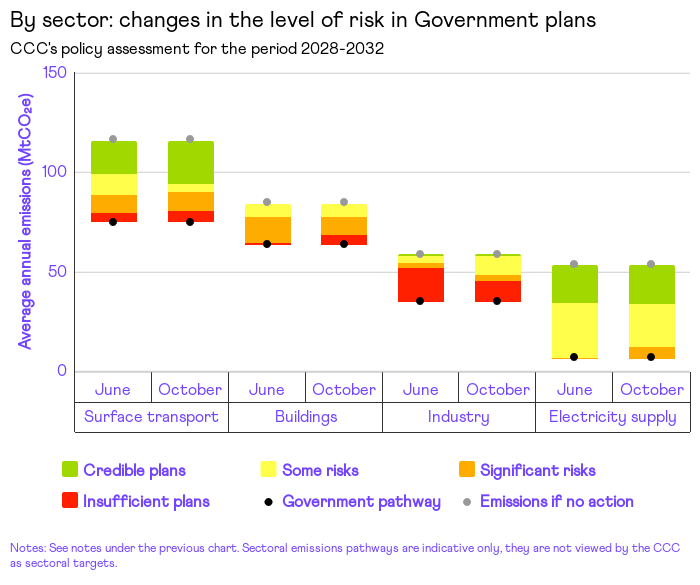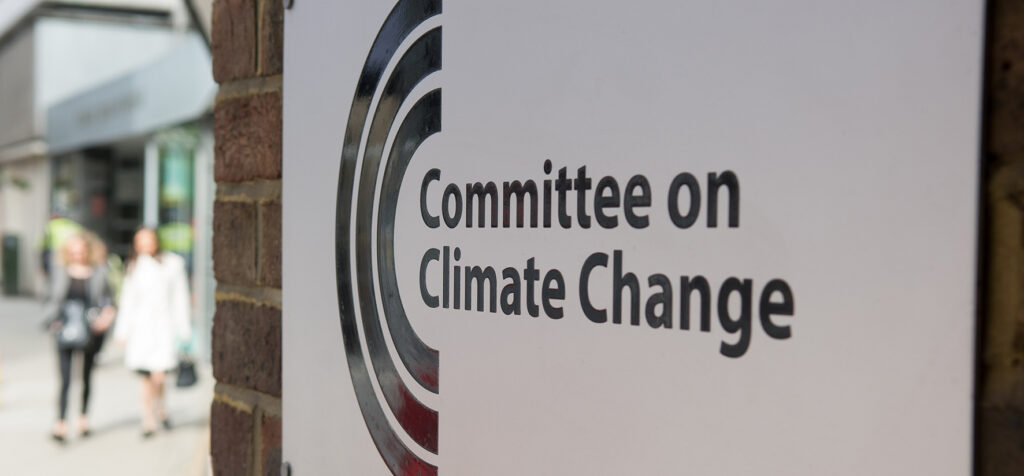“The cancellation of some net zero measures is likely to increase both energy bills and motoring costs for households,” the Climate Change Committee (CCC) has warned.
Responding to the latest developments made by Prime Minister Rishi Sunak in relation to net zero, the CCC revealed that the UK’s position as a global leader on climate change has now come under scrutiny as a result of the delays to net zero targets. This follows the organisation stating in June 2023 that the UK was not on track to meet the UK’s Nationally Determined Contribution (NDC) under the UN process for a 68% reduction in emissions by 2030.
CCC reaffirmed that their stance on this has not changed; the UK is unlikely to meet its NDC reduction target.
In fact, Sunak’s announcements have led to an increase in “insufficient plans” by the CCC. Without the announcement made by Sunak on 20 September, the figure would have stood at 14% – much lower than the 18% estimate made in June 2023. Instead, this dropped to 17%.

The CCC highlighted some of the notable developments that have made attaining future net zero targets harder for the UK.
Lack of awarded contracts for offshore wind
In the Contracts for Difference (CfD) Allocation Round 5 (AR5), offshore wind failed to secure any contracts. This sparked concern across the energy industry, particularly with the scheme seen as a critical component in the UK attaining its goal of reaching 50GW of offshore wind by 2030.
The CCC stated that this is one of the key developments that could now have a detrimental impact on the UK’s net zero journey. The organisation said that the “lack of any awarded contracts for offshore wind in AR5 was due to a failure to adjust the Administrative Strike Price to reflect substantial increases in supply chain costs beyond the level of general inflation”. This is something that CCC noted prior AR5.
Because of this, the CCC indicated that it is “imperative” that policy is adjusted to deliver contract awards and the commissioning of offshore wind farms as soon as possible.
Introduction of the ZEV mandate
Despite the failure in the CfD scheme in regard to offshore wind, it is worth noting a positive legislation introduced by the government that the CCC referenced. This was the highly anticipated zero emission vehicle (ZEV) mandate which confirmed UK vehicle electrification targets.
Following the government’s consultation which ended in May 2023, the mandate confirmed that by 2030, 80% of new cars and 70% of new vans sold in Britain must be zero emission and by 2035 all vehicles must be electric. Although the sale of internal combustion engine (ICE) vehicles target was extended from 2030 to 2035, the CCC noted that this would only have a small direct impact due to the ZEV mandate.
However, the CCC warned that there may be “other indirect consequences, through the uncertainty that has been introduced by changing near-term consumer targets”. This primarily points to increased risk that public and automotive companies perceive a weakening of government commitment to the EV transition. This could undermine consumer confidence and/or jeopardise some inward investment relating to EV manufacturing.
It is worth noting that the CCC also increased its “required emissions reductions” for 2030 from 25% to 28% covered by credible plans. This is due to the ZEV mandate which was offset in part by potential damage to consumer and investor confidence.
The CCC noted that overall increase in credible plans is “welcome”, but the government must increase this share further and improve consumer confidence.
THREAD
— Simon Evans (@DrSimEvans) October 12, 2023
Rishi Sunak's UK climate policy U-turns "made meeting future targets harder" says @theCCCuk
Sunak's cranked up risks to emissions cuts in buildings, transport & electricity
Contrary to Sunak, CCC says rollbacks "likely to incr…energy bills & motoring costs for hholds" pic.twitter.com/rvs4yWxrNn
Changes to the decarbonisation of homes a cause for concern
One other major factor which CCC referenced within its report is the changes made to the decarbonisation of heat.
As part of Sunak’s announcement made on 20 September, the Prime Minister declared that households will no longer be required to replace their gas boilers with low-carbon alternatives. This will only be required after 2035 and if the boiler needs to be switched either way, although there will be some exceptions to this rule. These were imposed to avoid “unacceptable costs to British families”.
The CCC stated that although the 2035 phase-out date is compatible with net zero, the exemption of 20% of households will have a considerable impact on carbon emissions all the way to 2050. This makes net zero by 2050 harder to achieve.
One of the biggest issues with this legislation means that there is increased uncertainty for consumers and also supply chains, a vital component for the decarbonisation of heat.
A final point made by the CCC reads: “Although the grant for heat pumps was increased from £5,000 to £7,500 it has not been accompanied by a larger budget and will, therefore, serve fewer homes.”
Professor Piers Forster, chair of the Climate Change Committee, said: “We welcome tangible positive policy progress in some key areas, most notably with the implementation of the new ZEV mandate and the recent deal with Tata Steel for industrial electrification in Port Talbot. But the Prime Minister has also relaxed important policies to decarbonise buildings and transport and sent a message to business and the international audience that he will allow more time for the UK to transition to key clean technologies. These steps have countered the positive progress of other announcements.
“We remain concerned about the likelihood of achieving the UK’s future targets, especially the substantial policy gap to the UK’s 2030 goal. Around a fifth of the required emissions reductions to 2030 are covered by plans that we assess as insufficient.
“Recent policy announcements were not accompanied by estimates of their effect on future emissions, nor evidence to back the government’s assurance that the UK’s targets will still be met. We urge the government to adopt greater transparency in updating its analysis at the time of major announcements.
Forster concluded: “Our position as a global leader on climate has come under renewed scrutiny following the Prime Minister’s speech. We urge the government to restate strong British leadership on climate change in the crucial period before the next climate summit, COP28 in Dubai.”






